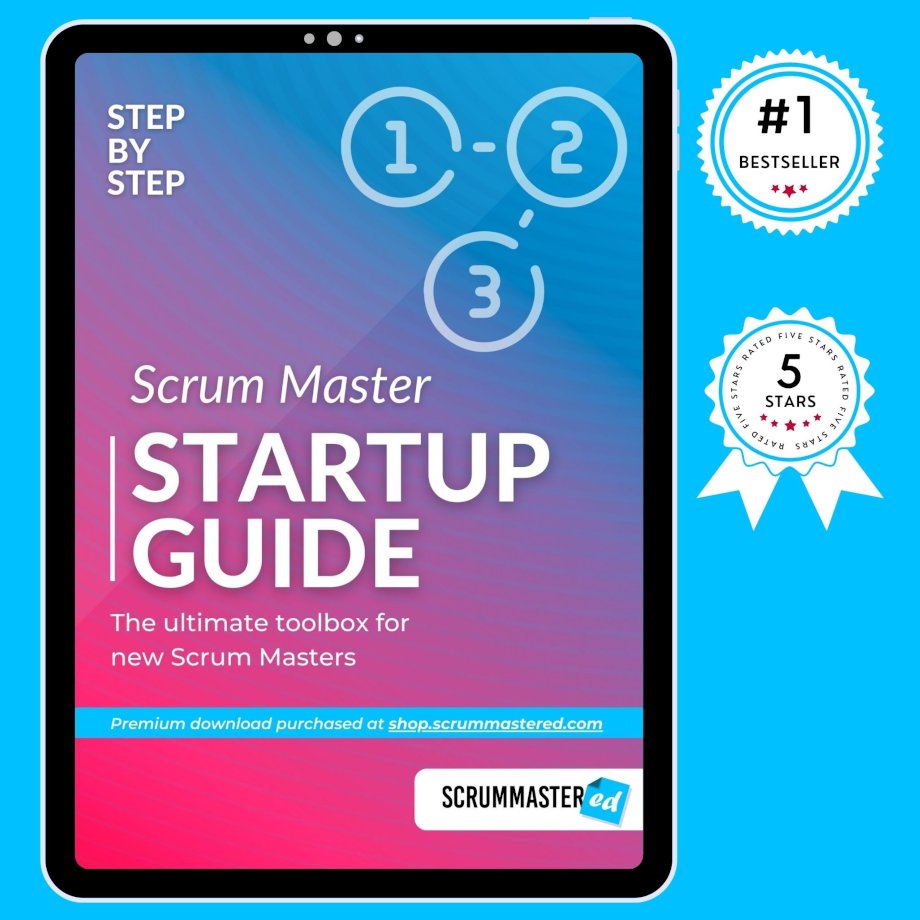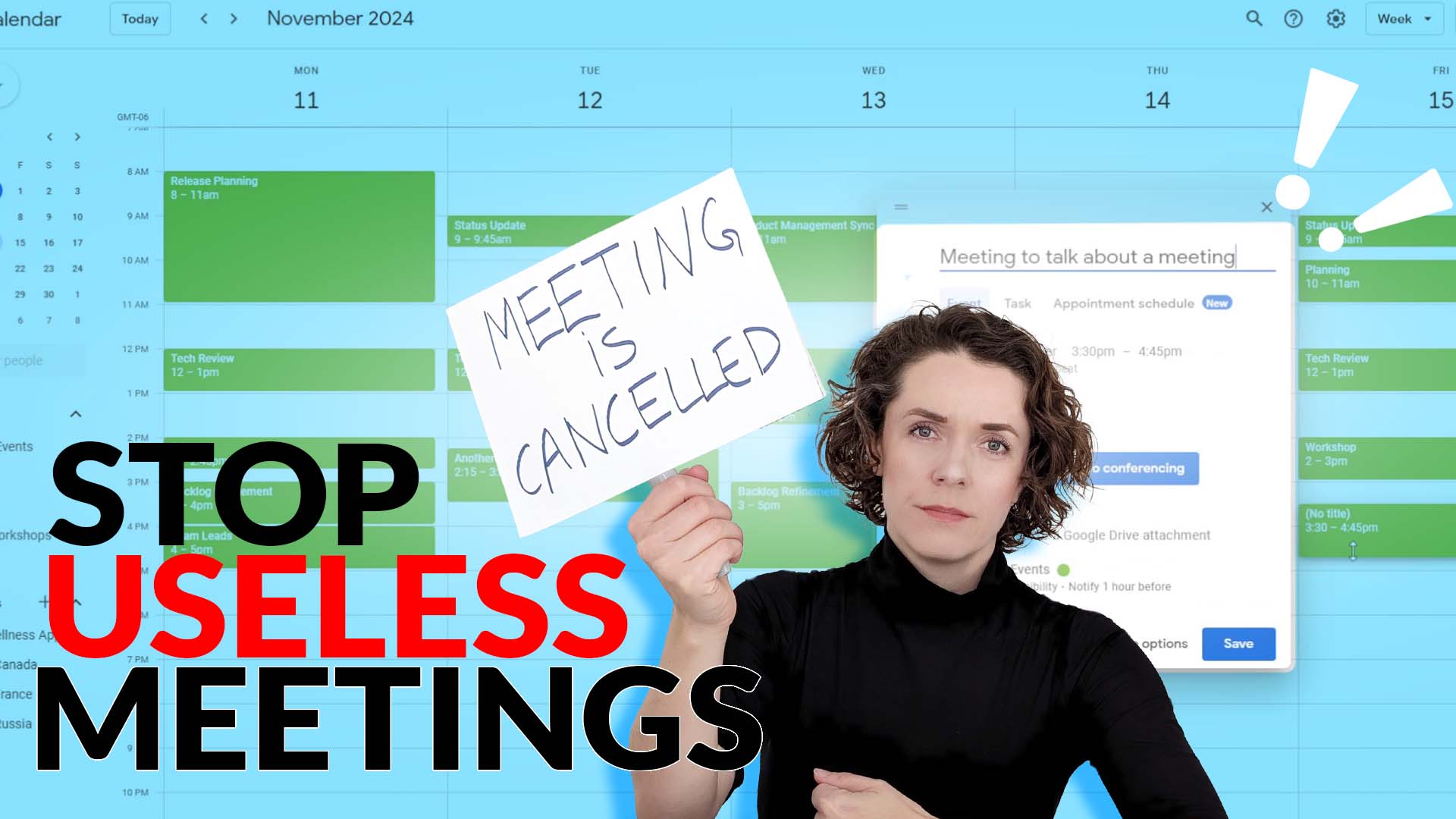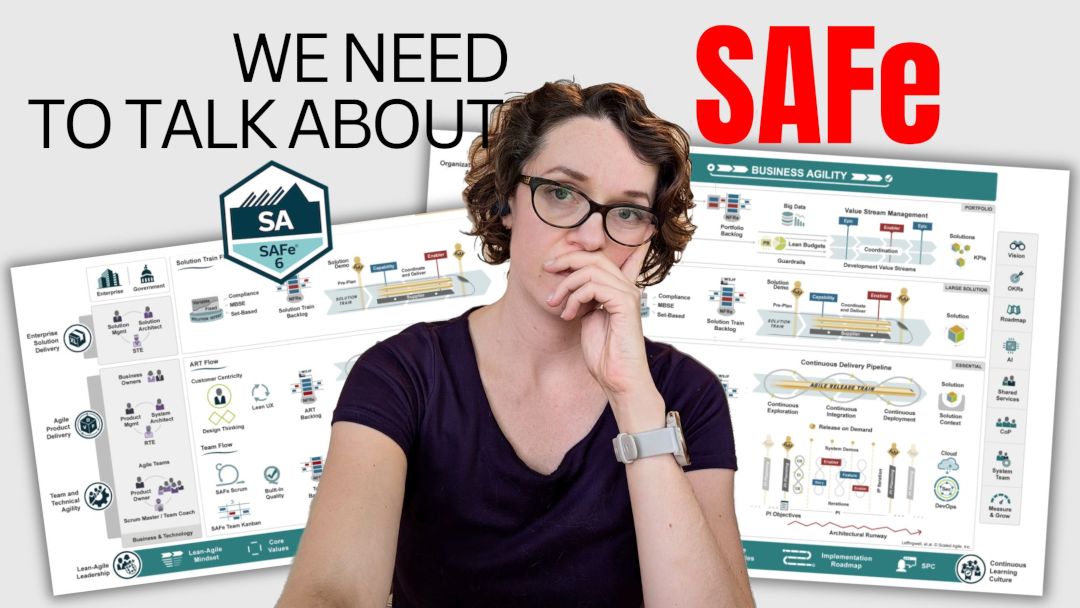Many people suffer from the imposter syndrome at work. I suppose that’s the natural way of things. And your long-term success will depend on how you manage it. And Scrum Master imposter syndrome is a real struggle due to the complexity of the work that we do and the lack of clear guidance on how to do it.
In this video, I’ll talk about how to build confidence in yourself as a Scrum Master and fight back that nagging feeling that you are not good enough.
I think most people sometimes get that feeling of an imposter. I don’t know what I’m doing and people will figure it out eventually.
And just because you have previously succeeded doesn’t make you immune to that.
As I said in the intro, Scrum Master are especially to feeling less confident in the role sometimes.
Why is that? Well, let me explain.
But before I continue, a quick reminder to subscribe, like the video and leave a comment down below.
And check out my guides and templates in ScrumMastered store.
I think there are several specific reasons for why we suffer from this so often.
Firstly, the role is often misunderstood as it doesn’t align with traditional job positions.
Agile way of working requires a completely different approach to managing people and projects which is focused on servant leadership.
It requires managers to let go of control and monitoring in the favor of leading by example and influencing without authority.
At the same time, it requires employees to take on more responsibility for their own success and no longer rely on managers to tell them what to do.
The role of a Scrum Master is that of a serving leader who coaches, teaches, facilitates instead of collecting metrics, creating plans, and reporting.
The results of our work are intangible, and hence, not easily seen.
Therefore, because we don’t produce the same type of results people who don’t understand the role have an impression that we don’t produce any results.
And we ourselves actually feel the same way for the same reasons. That’s just not what we learned in school – the results we were always asked to deliver were tangible.
And that makes us feel like imposters.
Secondly, we work with people during the times of change that often leads to a lot of pushback
We are the creatures of habit. We like the comfort of something we know well.
Change is scary, it brings a lot of uncertainty.
So naturally, people do not like change. And the role of the Scrum Master is to encourage and accelerate that change.
That is why we receive a lot of pushback from the people we work with who are struggling with new ways of working.
That, of course, can easily impact how we evaluate our success. The more people push back the more it seems we are going backwards.
In addition, change of this scale takes a lot of time and the results can only be seen after months of hard work.
This is another reason why Scrum Masters might feel like imposters.
And lastly, there is no instruction manual on how to do our job and we need to find solutions on our own most of the time.
My goal at ScrumMastered is to combat this challenge by providing you with practical materials and actionable tips.
But even though you can find lots of good books and guidance from me and especially other Agile experts, none of them will tell you exactly what to do and when.
A lot of the work we need to do depends on the situation at hand, on the team, on the organization, and what challenges they are facing.
If you are joining an organization that doesn’t have an Agile department or a team of Scrum Masters, you will need to figure things out completely on your own.
People working with you most likely will not know what you should do either. Your manager won’t give you a list of tasks and will instead expect you to take responsibility for your job.
And even if you get ideas and suggestions from others, you should take them with a grain of salt and make your own conclusions.
That is another big reason for why Scrum Masters are prone to the imposter syndrome.
We don’t have a simple list of tasks we can mark as done and instead we need to create our own tasks lists and ways to show the value we bring.
These are the three key reasons in my opinion that make it easy for us to fall into the imposter syndrome.
Well, that’s great and all, but what do you do with it and how do you build confidence in yourself?
I have a few recommendations for you.
ONE. Become the expert
As a Scrum Master you are accountable for establishing Scrum in the organization. It means that you need to have a very strong knowledge of it.
But not only that. You need to have a strong knowledge of various Agile practices that you can implement.
You need to build confidence in your knowledge so that even if others are questioning it, you can be sure of yourself.
For this you should spend quite a big amount of time on research and continuous learning.
Look up new ways to run retrospectives, find new tools for Product Backlog management, see what new models are popular in the Agile community.
There’s lots to learn and you should use that information to build your expertise.
TWO. Know what IS part of your role and what isn’t
I sometimes get questions from Scrum Masters on how to do certain things that I have no idea how to do.
They ask me because they were asked to do it by their managers.
You might be wondering – how come I don’t know how to do those things if I have so many years of experience.
The thing is… those tasks are not something I needed to do as a Scrum Master, so I never learned how to do them.
I once was asked by a COO to create a Gantt chart for a team working on five projects because they had trouble tracking progress.
Your initial reaction might be – that’s the COO asking, so you must have done it, right?
Well, actually, no. I said that I have no idea how to create Gantt charts.
(I lied since I have a master’s degree in Project Management…)
But it was just NOT a task I was willing to spend my time on as a Scrum Master. Instead, I talked about the time lost to context switching, decreasing team morale, and offered to facilitate a good prioritization and estimation session to set the right expectations with our customers.
As one quote says “Everybody is a genius. But if you judge a fish by its ability to climb a tree, it will live its whole life believing that it is stupid”.
So judge your ability based on what actually is the role of a Scrum Master and not purely on what you have been asked to do.

A lot of what I will be talking about in this video and more is actually part of my Scrum Master Startup Guide that you can get in my store.
There I go into much more detail about the role and give you specific action plans you can implement from day one.
THREE. Get comfortable with failure
You will fail. Many times. Get used to it. Because it is going to make it easier on you in the moments of feeling like an imposter.
Even the best of the best will sometimes find themselves in impossible situations where all their ideas and approaches fail.
Sometimes you will take a perfect facilitation technique for your retrospective, and still have a terrible boring and unispiring meeting.
Cringe a little bit.
But then start treating it like a learning opportunity: take notes on what went wrong, think of what might have been the underlying reasons, and figure out what you can do to make it better next time.
One failure doesn’t mean that you are an imposter. It means that you are working with complex problems that require some experimentation.
FOUR. Stand your ground
Some types of work may seem simple from the outside.
This often happens with Scrum. People read the 14 pages of the Scrum Guide and pass a quick Scrum Master assessment and they believe they know how to do it best.
But you and me, we know it’s not true. Theory and practice are far from each other.
So as a Scrum and Agile expert (see point number one), you have a better understanding of the complexities and challenges to take into account.
I mean, don’t be a d*ck and honestly consider other people’s opinions, but when you made a decision – stand your ground.
When something is part of your job and IS your decision to make, don’t ask for permission from others and do what you believe is best for the team and the organization.
Use language like “I believe it’s best if..”, “I made a decision to…”, “I will do it that way because…”.
FIVE. Pick your battles
Sometimes you will not have the power, the support, or the necessary resources to make something happen.
Sometimes you will face extreme resistance to simple solutions.
Yes, you want to be comfortable with failure. And you also need to know when to pull back.
Step away from situations that will cost you too much to resolve now.
Otherwise, if you do step into unwinnable battles, you will indeed feel like an imposter and will most likely be treated that way.
What kind of cost am I talking about?
Well, the trust others have in you, your credibility in the organization, the relationships you’ve built, the positive changes you have already implemented.
These are your most valuable assets. Pay attention to how you spend them.
SIX. Track your progress
The results of the Scrum Masters work are often intangible, but there are still ways of how you can track them.
You can run a team self-assessment, collect the happiness index, note any improvements implemented thanks to you.
Btw, I do have a few assessment tools in my store, go check them out.
When you track the qualitative results you can easily see your progress and the value your bring to your team to combat that imposter syndrome.
And you can use the same to show your value to your team and management.
If you are looking for help on your Scrum Master’s journey and would like to build confidence and credibility in your role, I invite you to check what programs are available.
At the time of filming this, I still have some spots in my mentorship program. All links will be in the description.
Ok, to summarize, there are three key reasons for why Scrum Masters struggle with imposter syndrome:
- The Scrum Master role is widely misunderstood
- People generally don’t like change
- No one will tell you what to do exactly on a daily basis
A few things you can do to help you overcome your imposter syndrome are:
- Become the Agile expert in your company
- Know what IS part of your role and what isn’t
- Stand your ground
- Get comfortable with failure
- Pick your battles, and
- Track your progress
And what is your secret for overcoming the imposter syndrome? Share in the comments 👇



